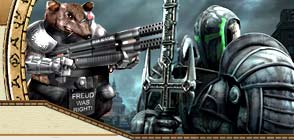 Вирус на Форуме, просьба к Админам Вирус на Форуме, просьба к Админам |
Здравствуйте, гость ( Вход | Регистрация )
  |
 13.01.2010 - 14:50 13.01.2010 - 14:50
Сообщение
#1
|
|
 сказочник      Группа: Капитан Стражей Сообщений: 1881 Регистрация: 8.08.2004 Из: Орден Светлых Пользователь №: 528 |
Проблема в том, что при открытии странички Форума некоторые антивирусные программы выдают предупреждение о том, что с данного сайта распространяется вирус. Что по понятным причинам отпугивает пользователей.
Некоторые программы выявляют проблему при сканировании после посещения форума. Вот техническая информация о проблеме: (в кратце) Уровень риска: низкий Это не червь и не вирус, а так называемый Tracking Cookie Сам по себе безвреден но может представлять проблему для вашей приватности. Т.е. по нему можно проследить посещаемые вами сайты. как я понимаю. Вобщем, с вашим компом ничего не случиться, но кто то может получить информацию, какие еще сайты вы посещаете. Прошу Админов разобраться с этим. Т.к. у меня нет ни возможности, ни необходимой квалификации. Полный текст статьи: QUOTE Tracking Cookie
Updated: March 13, 2009 1:58:06 AM Type: Other Risk Impact: Low Systems Affected: Linux, Symbian OS, UNIX, Windows 95, Windows 98, Windows CE, Windows NT, Windows Server 2003, Windows Vista, Windows XP SUMMARYBehaviorTracking Cookies are a specific type of cookie that is distributed, shared, and read across two or more unrelated Web sites for the purpose of gathering information or potentially to present customized data to you. Not all cookies are tracking cookies. Tracking cookies are not harmful like malware, worms, or viruses, but they can be a privacy concern. As an example, if you go to a Web site that hosts online advertising from a third-party vendor, the third-party vendor can place a cookie on your computer. If another Web site also has advertisements from the third-party vendor, then that vendor knows you have visited both Web sites. Nothing malicious has occurred, but the advertising company can determine indirectly all the sites you have been to if they have cookies present on those sites. ProtectionInitial Rapid Release version August 16, 2006 Latest Rapid Release version August 31, 2009 revision 025 Initial Daily Certified version August 16, 2006 Latest Daily Certified version September 1, 2009 revision 006 Initial Weekly Certified release date August 15, 2006 Click here for a more detailed description of Rapid Release and Daily Certified virus definitions. TECHNICAL DETAILST racking Cookie is a detection for pieces of information stored on computers after visiting certain Web sites. Tracking cookies are distributed and retrieved across multiple Web site domains allowing Web sites to monitor visitors' surfing habits. Some cookies can contain personal information or are bound to user profiles. A Little About Cookies A cookie is a text file that a Web site can install on your computer. Cookies enable a Web site to tailor pages presented to you by storing information about you in the cookie text file. The Web site can remember you for easy navigation and access during your return visits for products, services, and content. Advertisers may use this information to understand your Web surfing habits. Cookies are only text files and are NOT worms, viruses, or directly malicious, but they may have privacy implications. Tracking Cookies are a specific type of cookie that is distributed, shared, and read across two or more unrelated Web sites for the purpose of gathering information or potentially to present customized data to you. Not all cookies are tracking cookies. Tracking cookies are not harmful like malware, worms or viruses, but they can be a privacy concern. As an example, if you go to a Web site that hosts online advertising from a third-party vendor, the third-party vendor can place a cookie on your computer. If another Web site also has advertisements from the third-party vendor, then that vendor knows you have visited both Web sites. Are these advertisers directly interested in your specific browsing habits? Most likely not as this information is collected over thousands or millions of users to determine overall trends in Web surfing. Orphan Cookies Orphan cookies are cookie files in your Temporary Internet Files folder that do not belong to anything specifically in your browser index file, as well as listings in your browser index file that don’t have an associated cookie. There is nothing to worry about - these cookies are not seen by your browser, they are merely taking up hard drive space. Symantec Norton products use an "Orphan Cleanup" feature to remove these extra cookies. Are Cookies Dangerous? Contrary to what some users may think, cookies are NOT inherently malicious or dangerous. If you run a scan and you find a tracking cookie, the tracking cookie does not represent a malware infection. These are low to minimal security issues. We have seen many security companies and free "Spyware Removal Tools" emphasize detection of cookies, calling them Spyware and Trackware and stating that you are "infected", which is most unlikely to be the case. Cookies and the information they store are more related to privacy concerns. To determine if the privacy concern is an issue for you, you need to decide if the benefits of today’s enhanced Web site customizations outweigh the sensitivity of the information being collected. This is very similar to the power and flexibility of using major search engine technology and giving your frequent shopper card at your local grocery store – each has potential benefits and downsides. A search engine is helpful for quickly and easily finding information, but the search engine companies could potentially know about the types of things you search for and which links you decide to go to. We have grown accustomed to targeted information being presented to us, but our privacy is what may suffer as advertisers and corporations learn more about our Web surfing habits. How Do I Avoid Tracking Cookies? If you are still concerned about cookies, there are a few steps you can take. Certain Web sites may NOT function properly if cookies are removed or deleted. Be selective about which Web sites you visit. Check your browser’s privacy settings. Most browsers have settings to either delete or block cookies from your computer automatically. REMOVALThe following instructions pertain to all current and recent Symantec antivirus products, including the Symantec AntiVirus and Norton AntiVirus product lines. Disable System Restore (Windows Me/XP). Update the virus definitions. Run a full system scan. For specific details on each of these steps, read the following instructions. 1. To disable System Restore (Windows Me/XP) If you are running Windows Me or Windows XP, we recommend that you temporarily turn off System Restore. Windows Me/XP uses this feature, which is enabled by default, to restore the files on your computer in case they become damaged. If a virus, worm, or Trojan infects a computer, System Restore may back up the virus, worm, or Trojan on the computer. Windows prevents outside programs, including antivirus programs, from modifying System Restore. Therefore, antivirus programs or tools cannot remove threats in the System Restore folder. As a result, System Restore has the potential of restoring an infected file on your computer, even after you have cleaned the infected files from all the other locations. Also, a virus scan may detect a threat in the System Restore folder even though you have removed the threat. For instructions on how to turn off System Restore, read your Windows documentation, or one of the following articles: How to disable or enable Windows Me System Restore How to turn off or turn on Windows XP System Restore Note: When you are completely finished with the removal procedure and are satisfied that the threat has been removed, reenable System Restore by following the instructions in the aforementioned documents. For additional information, and an alternative to disabling Windows Me System Restore, see the Microsoft Knowledge Base article: Antivirus Tools Cannot Clean Infected Files in the _Restore Folder (Article ID: Q263455). 2. To update the virus definitions Symantec Security Response fully tests all the virus definitions for quality assurance before they are posted to our servers. There are two ways to obtain the most recent virus definitions: Running LiveUpdate, which is the easiest way to obtain virus definitions. If you use Norton AntiVirus 2006, Symantec AntiVirus Corporate Edition 10.0, or newer products, LiveUpdate definitions are updated daily. These products include newer technology. If you use Norton AntiVirus 2005, Symantec AntiVirus Corporate Edition 9.0, or earlier products, LiveUpdate definitions are updated weekly. The exception is major outbreaks, when definitions are updated more often. Downloading the definitions using the Intelligent Updater: The Intelligent Updater virus definitions are posted daily. You should download the definitions from the Symantec Security Response Web site and manually install them. The latest Intelligent Updater virus definitions can be obtained here: Intelligent Updater virus definitions. For detailed instructions read the document: How to update virus definition files using the Intelligent Updater. 3. To run a full system scan Start your Symantec antivirus program and make sure that it is configured to scan all the files. For Norton AntiVirus consumer products: Read the document: How to configure Norton AntiVirus to scan all files. For Symantec AntiVirus Enterprise products: Read the document: How to verify that a Symantec Corporate antivirus product is set to scan all files. Run a full system scan. If any files are detected, follow the instructions displayed by your antivirus program. Important: If you are unable to start your Symantec antivirus product or the product reports that it cannot delete a detected file, you may need to stop the risk from running in order to remove it. To do this, run the scan in Safe mode. For instructions, read the document, How to start the computer in Safe Mode. Once you have restarted in Safe mode, run the scan again. After the files are deleted, restart the computer in Normal mode. -------------------- - Скажите, не встречались ли мы в прошлом году во время бойни у города Психус?
|
|
|
|
 2.12.2010 - 23:54 2.12.2010 - 23:54
Сообщение
#2
|
|
 Домовой Гондора Группа: Root Admin Сообщений: 236 Регистрация: 25.03.2004 Пользователь №: 1 |
Удалил сегодня полностью. Посмотрим, будут ли рецидивы.
Подал запрос в гугл на перепроверку сайта на вирьё. В течение суток он осуществится. Если сайт пройдёт проверку, задравший всех алерт о вероятном наличии вируса уйдёт в небытие. -------------------- Видите ли, я с рождения абсолютно уверен, что совершенно замечателен сам по себе и никакая дурная репутация мне не повредит! То есть я слишком самовлюблён, чтобы утруждать себя попытками самоутвердиться, если вы понимаете, что я имею в виду...
© Макс Фрай |
|
|
|
 3.12.2010 - 15:43 3.12.2010 - 15:43
Сообщение
#3
|
|
 ????   Группа: Житель Сообщений: 69 Регистрация: 31.05.2006 Из: Москва Пользователь №: 5899 |
Все, Арендил.
Никаких (лично у меня) алертов не имеется. -------------------- Chrono Cross Lyrics
What was the start of all this? When did the cogs of fate begin to turn? Perhaps it is impossible to grasp that answer now, From deep within the flow of time... But, for a certainty, back then, We loved so many, yet hated so much, We hurt others and were hurt ourselves... Yet even then, we ran like the wind. Whilst our laughter echoed, Under cerulean skies... Жить - значит каждую секунду подползать к смерти. (Мигель, Chrono Cross) |
|
|
|
  |
1 чел. читают эту тему (гостей: 1, скрытых пользователей: 0)
Пользователей: 0
| Текстовая версия | Сейчас: 5.09.2025 - 17:34 |











